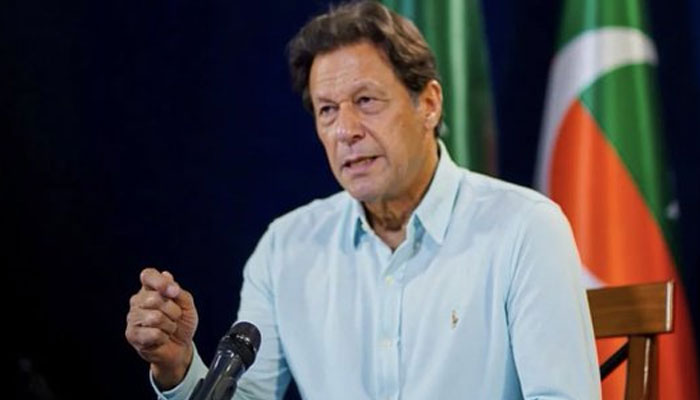Why should Imran Khan be worried?
There may not be a mega corruption case against Imran Khan but the cases like Toshakhana and foreign funding should worry him squarely on account of what the Supreme Court had ruled in Nawaz Sharif’s disqualification case
ISLAMABAD: There may not be a mega corruption case against the Pakistan Tehreek-e-Insaf (PTI) chief but the cases like Toshakhana and foreign funding should worry Imran Khan squarely on account of what the Supreme Court had ruled in Nawaz Sharif’s disqualification case.
The SC’s Panama case verdict of June 2017, which had removed the-then Prime Minister Nawaz Sharif and disqualified him for life as well, has always been appreciated by Imran Khan and the PTI. But the following few paras of the same judgment have all the ingredients to seriously haunt Imran Khan.
Dubbed by many as a bad decision and a bad precedent, the SC’s verdict concluded:
“It is hereby declared that having failed to disclose his un-withdrawn receivables constituting assets from Capital FZE Jebel Ali, UAE in his nomination papers filed for the General Elections held in 2013 in terms of Section 12(2)(f) of the Representation of the People Act 1976 (ROPA), and having furnished a false declaration under solemn affirmation respondent No. 1 Mian Muhammad Nawaz Sharif is not honest in terms of Section 99(f) of Const. Ps. No. 29-30/2016 & 03/2017. ROPA and Article 62(1)(f) of the Constitution of the Islamic Republic of Pakistan, 1973 and therefore he is disqualified to be a Member of the Majlis-e-Shoora (Parliament).”
The SC added, “The Election Commission of Pakistan shall issue a notification disqualifying respondent No. 1 Mian Muhammad Nawaz Sharif from being a Member of the Majlis-e-Shoora (Parliament) with immediate effect, whereafter he shall cease to be the Prime Minister of Pakistan.”
Even if it was a controversial decision or a bad one -- as many view it -- the precedent has been set and now Imran Khan’s case would be judged in the light of the same judgment by the same Supreme Court.
The SC had removed the PM and disqualified Nawaz Sharif for failing to disclose in his nomination papers “unwithdrawn receivables”.
In the case of Imran Khan, he reportedly did not disclose the proceeds of Toshakhana gifts in his annual assets declaration which was submitted before the ECP. Reports suggest that Khan had declared these assets a year or two later only when the media had focused on the Toshakhana scandal and alleged that he had sold some of these gifts.
The parallel between Nawaz and Imran cases is that both the leaders had made their declaration regarding their assets before the ECP. In the case of Nawaz Sharif, he did not declare what he had not received but was receivable. In the case of Imran Khan, he did not declare what he had received through the proceeds of Toshakhana gifts. Khan declared them only in a later declaration.
Nawaz Sharif had made his declaration in his nomination paper for the 2013 elections, which his party won and led to his third tenure as the Prime Minister of Pakistan. Imran Khan made this declaration during his premiership and as part of the mandatory legal requirement for all members of Parliament to annually submit their declaration regarding their assets and liabilities.
Following the ECP’s recent decision, questions are also being raised about Imran Khan’s certification of the PTI funding and whether he is liable to be penalised for certifying grossly wrong facts about the nature of such funding.
-
 PayPal Data Breach Exposed Sensitive User Data For Six-month Period; What You Need To Know
PayPal Data Breach Exposed Sensitive User Data For Six-month Period; What You Need To Know -
 Prince William Receives First Heartbreaking News After Andrew Arrest
Prince William Receives First Heartbreaking News After Andrew Arrest -
 11-year-old Allegedly Kills Father Over Confiscated Nintendo Switch
11-year-old Allegedly Kills Father Over Confiscated Nintendo Switch -
 Jacob Elordi Talks About Filming Steamy Scenes With Margot Robbie In 'Wuthering Heights'
Jacob Elordi Talks About Filming Steamy Scenes With Margot Robbie In 'Wuthering Heights' -
 Why Prince Harry Really Wants To Reconcile With King Charles, Prince William, Kate Middleton?
Why Prince Harry Really Wants To Reconcile With King Charles, Prince William, Kate Middleton? -
 'Grief Is Cruel': Kelly Osbourne Offers Glimpse Into Hidden Pain Over Rockstar Father Ozzy Death
'Grief Is Cruel': Kelly Osbourne Offers Glimpse Into Hidden Pain Over Rockstar Father Ozzy Death -
 Timothée Chalamet Reveals Rare Impact Of Not Attending Acting School On Career
Timothée Chalamet Reveals Rare Impact Of Not Attending Acting School On Career -
 Liza Minnelli Gets Candid About Her Struggles With Substance Abuse Post Death Of Mum Judy Garland
Liza Minnelli Gets Candid About Her Struggles With Substance Abuse Post Death Of Mum Judy Garland -
 'Saturday Night Live' Star Will Forte Reveals How He Feels About Returning To The Show After 2010 Exit
'Saturday Night Live' Star Will Forte Reveals How He Feels About Returning To The Show After 2010 Exit -
 Police Officer Arrested Over Alleged Assault Hours After Oath-taking
Police Officer Arrested Over Alleged Assault Hours After Oath-taking -
 Maxwell Seeks To Block Further Release Of Epstein Files, Calls Law ‘unconstitutional’
Maxwell Seeks To Block Further Release Of Epstein Files, Calls Law ‘unconstitutional’ -
 Prince William Issues 'ultimatum' To Queen Camilla As Monarchy Is In 'delicate Phase'
Prince William Issues 'ultimatum' To Queen Camilla As Monarchy Is In 'delicate Phase' -
 Winter Olympics 2026: Remembering The Most Unforgettable, Heartwarming Stories
Winter Olympics 2026: Remembering The Most Unforgettable, Heartwarming Stories -
 King Charles Hands All Of Andrew Mountbatten-Windsor’s Records And Files To Police: Report
King Charles Hands All Of Andrew Mountbatten-Windsor’s Records And Files To Police: Report -
 Eric Dane's Family Shares Heartbreaking Statement After His Death
Eric Dane's Family Shares Heartbreaking Statement After His Death -
 Samsung Brings Perplexity AI To Galaxy S26 With ‘Hey Plex’ Voice Command
Samsung Brings Perplexity AI To Galaxy S26 With ‘Hey Plex’ Voice Command




